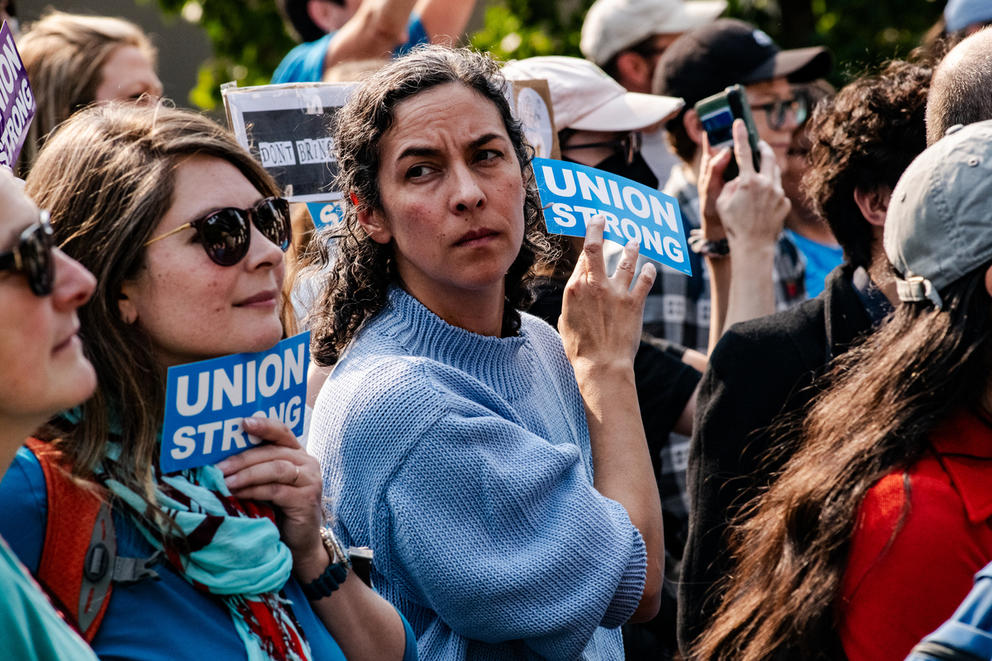“We work tirelessly around the clock, holidays, weekends, 24/7 to coordinate services to serve this community,” said Jennifer Clayton, a 911 dispatcher and president of the Seattle Dispatchers Guild during Tuesday’s Council public comment period. “We ask you to support the coalition bargaining agreement as we support the community every day. We need the support to continue to serve the city with experienced, dedicated employees through fair wages that allow us to be part of this city.”
The Coalition of City Unions and Mayor Bruce Harrell’s labor representatives had been locked in tense negotiations for more than a year, mostly over wages. The Coalition asked for a 9.2% across-the-board raise, but the city held fast on its offer of a 1% raise. Last August, union members walked away from the bargaining table in protest of the 1% offer and threatened to strike come January of this year.
The city and Coalition reached a tentative agreement on the new contracts in December. City union members voted to ratify the contracts in early March. The Council’s vote Tuesday was the last step in the process.
“It is incredibly important that all city workers know that we here at the City Council support the work that you do,” said Councilmember Dan Strauss, who sponsored the package of four bills Tuesday. “We understand that without you we cannot provide the basic services to all Seattle residents. And you also need to be compensated in a way that allows you to live, work, play and not survive but thrive in our city.”
The Coalition includes members from 16 unions: AFSCME Council 2, Boilermakers Local 104, Court Marshal’s Guild, IAM District 160, IATSE Local 15, IBEW Local 46, Inlandboatmen’s Union, IUOE Local 302, IUPAT District Council 5, LiUNA Local 242, PROTEC17, Seattle Dispatchers Guild, Sheet Metal Workers Local 66, Teamsters 117, Teamsters 763 and UNITE HERE! Local 8.
Several city unions do not bargain as part of the Coalition, including the Seattle Police Management Association, Fire Fighters Local 27 and the Seattle Police Officers Guild. The police union reached a tentative agreement at the end of March.
The newly approved contracts will take effect retroactively to Jan. 1, 2023 and last through Dec. 31, 2026.
Across the board, workers will get a 5% retroactive pay increase for 2023 and 4% for 2024, which will be paid together this year. In 2025, raises will be pegged to the regional Consumer Price Index with a minimum 2% raise and maximum of 4%. In 2026, raises will be pegged to inflation with a minimum of 2% and maximum of 5%.
In addition, 500 job classifications will get wage adjustments based on market rates for similar public sector jobs. For classifications currently paid less than $48,000 annually, the adjusted wages will be considered effective Jan. 1, 2023, and provide back pay. For those earning more, the adjustments will be phased in this year and next.
Evening and night workers also get a slight boost in the additional pay they already receive for working swing shifts. For those working evenings, the additional pay increases from $1 an hour to $1.25. The night shift pay differential increases from $1.50 to $1.75 an hour extra.
Workers also get a higher maximum reimbursement for required work gear such as boots, raingear and gloves — from $110 to $300 in 2023 and an additional $25 each year until 2026. Vacation days will start accruing faster, after four years on the job rather than the current five. The new contracts expand the definition of bereavement leave from a worker’s “close relative” to “any person related to the employee by blood, marriage, adoption, fostering, guardianship, in loco parentis or domestic partnership.”
City workers have complained about high turnover and vacancies in city departments in recent years and have blamed low pay as a key factor.
In public testimony Tuesday, Sacha Bommarito, a city emergency vehicle mechanic and Machinists Local 289 union steward, said that city mechanics working on fire trucks, police and city light vehicles and the downtown motor pool are working with a “skeleton crew,” which exacerbates burnout.
“We’re losing skilled technicians at unprecedented and unsustainable rates,” said Bommarito. “It’s not just mechanics. It’s carpenters, plumbers, electricians. We need to be able to offer more and we need to do it fast.”
The Council’s actions on Tuesday also provide comparable wage increases and benefits for about 3,000 non-union employees of the city and open the door for pay increases for another 1,500 non-union employees in managerial and executive positions. These latter increases are subject to management discretion and the Council’s appropriation of additional funds.
Finally, Councilmembers approved a bargaining agreement between the city and a new union of 173 Seattle Public Utilities managers and strategic advisors now represented by the AFSCME Local 21SP. Those workers won back pay beginning in 2022 and retroactive 2021 signing bonuses, among other benefits.
The raises for Coalition members, non-union employees and new Seattle Public Utilities union members will cost the city general fund an additional $39.6 million in 2023 retroactive and 2024 pay. The city estimates it will add an additional $38.8 million in 2025 and $50 million in 2026 to general fund expenses.
The increased wages come as the mayor and Council grapple with a projected general fund budget deficit of at least $230 million beginning in 2025. The city’s current budget factors in estimated labor cost increases in anticipation of a new bargaining agreement and other forthcoming raises, but there is still a gap of about $10 million to close in this year’s budget. The raises also add another $10.7 million to next year’s projected general fund deficit.
In his first salvo toward addressing the budget deficit, Harrell instituted a hiring freeze in January for open city positions, with an exception for public safety roles. A Council central staff analysis of the labor cost increases said that the hiring freeze may be sufficient to close that $10 million gap in the 2024 budget. If not, staff expect unspent money in the 2023 budget to cover the rest.
But that leaves a hole of about $240 million in the 2025 budget for Harrell and the Council to close. The City Council’s newly elected majority has pledged to look for ways to cut existing expenses in the budget or use money from the Jumpstart payroll expense tax that’s currently earmarked for affordable housing, small-business support, community development and climate programs.
Most Councilmembers have expressed opposition to implementing new taxes to cover the deficit. Councilmember Tammy Morales, by contrast, reiterated her support Tuesday for implementing new taxes to cover the deficit.
In addition to the impact of the raises approved Tuesday, city officials will soon have to deal with raises, retroactive pay and other benefits for Seattle police officers. At the end of March, the Seattle Police Officers Guild reached a tentative agreement with the city on its new contract, which it has been negotiating with the city since 2018.
Publicola reported Tuesday that the contract includes new starting pay of $103,000 for officers, up from $83,000 currently, and three years of back pay.




